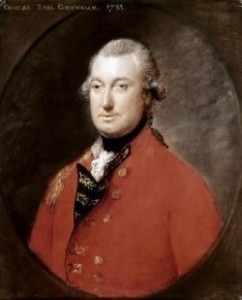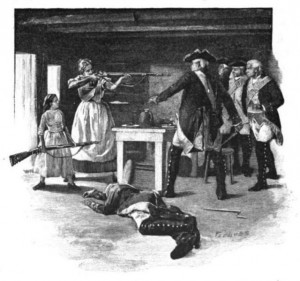 While His Majesty’s army was in North America trying to subdue the insurrection, one of Lord Cornwallis’s officers acknowledged the courage and resourcefulness of those American women who weren’t the King’s Friends when he said to His Lordship: “We may destroy all the men in America, and we shall still have all we can do to defeat the women.” Possibly the officer was thinking of those women who had put suppliers out of business by exercising their choice not to buy cloth and tea. He may even have been thinking of women-organized tea parties, such as the one in Edenton, North Carolina. Women in Britain didn’t have the latitude to organize such protests.
While His Majesty’s army was in North America trying to subdue the insurrection, one of Lord Cornwallis’s officers acknowledged the courage and resourcefulness of those American women who weren’t the King’s Friends when he said to His Lordship: “We may destroy all the men in America, and we shall still have all we can do to defeat the women.” Possibly the officer was thinking of those women who had put suppliers out of business by exercising their choice not to buy cloth and tea. He may even have been thinking of women-organized tea parties, such as the one in Edenton, North Carolina. Women in Britain didn’t have the latitude to organize such protests.
Toward the end of the American Revolution, Cornwallis spent a lot of time in the southern colonies. There his impression of patriot women couldn’t help but receive constant reinforcement that his officer’s statement had been on the mark. Here are a few of the women who may have influenced his opinion.
 At her home in the backcountry of Georgia, Nancy Morgan Hart was menaced by six loyalists, who ordered her to cook for them. They helped themselves to her food and liquor, and while they were inattentive, she stole their muskets. Caught in the act, she shot at least two of the men who tried to recover their weapons. She then took the rest captive. When her husband and several neighbors arrived, she insisted that the loyalists be hanged. It’s difficult to distinguish fact from folklore in her story. But in 1912, workers building a railroad near the cabin found six men’s skeletons buried neatly, side by side. The necks of several had been broken, as in a hanging.
At her home in the backcountry of Georgia, Nancy Morgan Hart was menaced by six loyalists, who ordered her to cook for them. They helped themselves to her food and liquor, and while they were inattentive, she stole their muskets. Caught in the act, she shot at least two of the men who tried to recover their weapons. She then took the rest captive. When her husband and several neighbors arrived, she insisted that the loyalists be hanged. It’s difficult to distinguish fact from folklore in her story. But in 1912, workers building a railroad near the cabin found six men’s skeletons buried neatly, side by side. The necks of several had been broken, as in a hanging.
Kate Moore Barry served as a scout for the patriots in the South Carolina backcountry. Her activities helped General Daniel Morgan defeat Crown forces commanded by Banastre Tarleton at the Battle of the Cowpens. One day she heard gunfire from loyalist forces at a neighboring homestead. She tied her infant to a bedpost and rode her horse to warn patriots. Her home, Walnut Grove Plantation, has been restored and is open to visitors. In October, visitors are treated to an annual battle reenactment there.
Loyalist David Fanning trapped patriot militia leader Philip Alston and his men—as well as Alston’s wife, Temperance, and their children—in their house in backcountry North Carolina. The two forces then opened fire on each other. When musket balls penetrated the house, Temperance Smith Alston supposedly shoved her kids up a brick chimney to shield them. Fanning threatened to set fire to the house. Temperance emerged in the hail of musket balls waving a flag of truce. She negotiated so well that her husband and his men were paroled instead of imprisoned. “The House in the Horseshoe” is open to visitors, and there’s an annual battle reenactment in August.
Did Lord Cornwallis, like his officer, recognize a formidable foe in patriot women? There is no record of Cornwallis having disagreed with the officer. What do you think?
**********
Did you like what you read? Learn about downloads, discounts, and special offers from Relevant History authors and Suzanne Adair. Subscribe to Suzanne’s free newsletter.

Hart County and the town of Hartwell, GA, not too far from where I live in SC, were both named for Nancy Hart.
Right, Tracy. I think that’s the only county in Georgia named for a woman.
FASCINATING! I loved learning this information.
Thanks, Rebecca. Seems like all the fun information like this was left out of our history books.